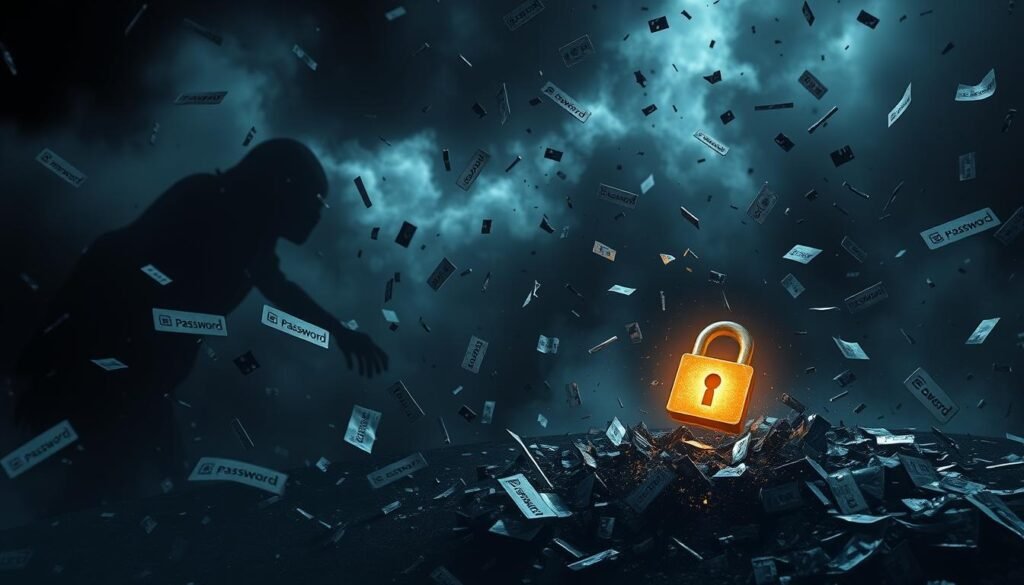In 2021, a study by UpGuard found that half of the Fortune 500 companies were leaking data. This data was useful for cybercriminals. They found it in public documents1. Also, UpGuard discovered that 47 organizations were leaking data through Microsoft’s PowerApp solutions. This exposed tens of millions of private records1.
These findings show how important it is to protect our data online. As we use more online services, the risk of data leaks grows. Cybercriminals look for ways to get our sensitive information. It’s key to stop internet leaks to avoid the harm caused by data breaches and cyber attacks. Our approach to data leak prevention can help keep your digital assets safe.
Key Takeaways
- Data leaks are a big risk, with half of Fortune 500 companies exposing sensitive information that can be exploited by cybercriminals.
- Misconfigured cloud services can lead to the unintentional exposure of millions of private records, highlighting the need for robust security measures.
- Cybercriminals actively seek out vulnerable data on the dark web, necessitating proactive monitoring and prevention strategies.
- Implementing a comprehensive data leak prevention strategy is essential to safeguard your organization’s sensitive information and mitigate the consequences of data breaches.
- A multi-layered approach combining technology, processes, and employee education is crucial for effective internet leak prevention.
Understanding Internet Leaks
Internet leaks, also known as data leaks, happen when sensitive information gets shared online by mistake. These leaks can come from internal mistakes, weak data security, or cybercriminals2. Data leaks and breaches are often mixed up, but they’re different. Leaks are accidental, while breaches are intentional hacks or social engineering3.
What is an Internet Leak?
An internet leak is when private or confidential data is shared online without meaning to. This can be personal info like names, addresses, or social security numbers. It can also be business data like financial reports or trade secrets3. Criminals use these leaks to steal identities, commit financial fraud, and more2.
Types of Internet Leaks
There are several types of internet leaks:
- Personal data leaks: When people’s private info, like social security numbers or medical records, gets shared3.
- Corporate leaks: When companies’ sensitive data, like financial reports or source code, is leaked2.
- Government leaks: When government secrets or classified info is shared without permission2.
Internet leaks can harm both people and companies. They can lead to identity theft, financial loss, damage to reputation, and legal trouble23.
To stop and lessen the effects of internet leaks, we need a strong cybersecurity plan. This includes regular checks, training employees, and using good data protection2. By being careful and following best practices, we can protect sensitive info and avoid the harm caused by leaks23.
| Characteristic | Data Leak | Data Breach |
|---|---|---|
| Cause | Internal errors, poor data security, lack of employee training, outdated systems | Malicious hacking, social engineering tactics |
| Intent | Accidental, unintentional | Intentional, premeditated |
| Consequences | Identity theft, data breaches, ransomware installation | Identity theft, financial fraud, reputational damage |
Why Internet Leaks are Dangerous
Data breaches can cause big problems for people and companies. For individuals, they can lead to identity theft, financial losses, and privacy invasion4. Thieves might use stolen info to pretend to be someone else, open fake accounts, or make unauthorized buys5.
This can hurt your credit report. It might stop you from getting loans, jobs, or lower your credit score because of financial identity theft.
Consequences of Data Breaches
For companies, data breaches can damage their reputation, lead to fines, and lose customer trust4. These issues can cut down on revenue and market share4. Companies that follow rules like GDPR might face huge fines if they leak data4.
Deloitte’s report said a cyberattack could cost a company $230 million. It can also harm their business for a long time.
Risks to Individuals and Businesses
Data leaks can reveal lots of personal info, like birthdays, SSNs, emails, and more6. Accidentally sharing this info can lead to social media scams, cyber-attacks, and identity theft6. Hackers use data leaks to find victims and plan attacks6.
Businesses hit by data leaks might face huge costs. A US tech company lost $1.2 billion because of it4. Legal trouble can also follow, especially if the breach is not reported quickly or covered up5.

“80% of data breaches are linked to weak passwords, indicating the importance of password security measures such as password managers like 1Password to mitigate the risk.”4
Most data breaches come from human mistakes, like weak passwords4. Studies show 95% of breaches are due to user errors. This shows the need for good employee training and awareness4.
Tools and systems can also leak data if not set up right. This highlights the need for secure configurations4. Shadow IT, where employees use unauthorized apps or devices, is another risk. It’s important to watch and control tech use in companies4.
Preventing Internet Leaks
To keep our internet safe, we need to do several things. First, we should update our devices and accounts often. We should also use strong passwords and enable multi-factor authentication7. Training employees on security can also help prevent data leaks7.
Secure Your Devices and Accounts
To make our devices and accounts safer, we can use encrypted cloud storage and VPNs. We should also back up our data regularly8. Keeping a zero-trust environment and using multi-factor authentication limits who can access our data7.
Regularly checking for vulnerabilities and doing penetration tests helps find and fix security issues7.
Implement Data Loss Prevention Solutions
Using DLP solutions is key to keeping our data safe9. These tools help stop unauthorized data access and leaks7. We need to set up DLP policies to watch and control sensitive information9.
Monitor Network Activity and Access Logs
Watching our network and access logs is vital to catch and stop leaks9. Using UEBA to monitor user behavior helps spot insider threats early9. Keeping an eye on ransomware blogs also helps protect our data7.
By taking these steps, we can greatly lower the risk of internet leaks.
Conclusion
Keeping your data safe from internet leaks is key today10. Knowing about different leaks and how to stop them helps protect our info10. We must secure our devices, use data loss prevention, and watch our network activity11.
Internet leaks are a big threat, but we can fight back10. Being careful, using strong security, and working with good cybersecurity teams helps11. Together, we can make the internet safer for everyone12.
Protecting our data is important for all of us, not just ourselves10. By stopping internet leaks, we keep our info safe and help the whole digital world11. Let’s work together to make the internet a safer place for everyone12.
FAQ
What is an internet leak?
What are the different types of internet leaks?
Why are internet leaks dangerous?
How can we prevent internet leaks?
How can monitoring ransomware blogs help prevent internet leaks?
Source Links
- 8 Data Leak Prevention Strategies in 2024 | UpGuard – https://www.upguard.com/blog/data-leak-prevention-tips
- What Is a Data Leak? Causes & Prevention – https://abnormalsecurity.com/glossary/data-leak
- Check if Your Private Info is Exposed Online – https://www.bitdefender.com/cyberpedia/what-are-private-data-leaks/?srsltid=AfmBOop-7xvjOvgKIpMcnAhz4dwTBpbThpfh3Kf82NUYpNCAEK1GWKoU
- Data Leaks: The Biggest Risks, Consequences, Causes & How to Prevent Them | Metomic – https://metomic.io/resource-centre/what-are-the-biggest-risks-of-data-leaks
- What Are the Risks of a Data Leak? – Ledger – https://campuspress.yale.edu/ledger/what-are-the-risks-of-a-data-leak/
- Check if Your Private Info is Exposed Online – https://www.bitdefender.com/cyberpedia/what-are-private-data-leaks/?srsltid=AfmBOor1y7PWfOvUKAfm9l0tG48EXEiEnf0oDTjwo2tdtLHN0MXWLBA8
- Council Post: Five Ways Organizations Can Help Prevent Data Leaks – https://www.forbes.com/councils/forbestechcouncil/2023/05/08/five-ways-organizations-can-help-prevent-data-leaks/
- Check if Your Private Info is Exposed Online – https://www.bitdefender.com/cyberpedia/what-are-private-data-leaks/?srsltid=AfmBOoolracpMYZ5k9QxCdw12CTTpxESakxtdsiALxfwfp7Elu02Z18w
- How to Stop Data Leaks in Their Tracks – https://www.lookout.com/blog/how-to-prevent-data-leaks
- What is a Data Leak? Stop Giving Cybercriminals Free Access | UpGuard – https://www.upguard.com/blog/data-leak
- Understanding Data Leaks: Origins, Impacts, and Prevention – https://vipre.com/glossary-terms/understanding-data-leaks-prevention/
- Nine Out of Ten of the Internet’s Top Websites Are Leaking Your Data – https://www.vice.com/en/article/9-out-of-10-of-the-internets-top-websites-are-leaking-your-data/

